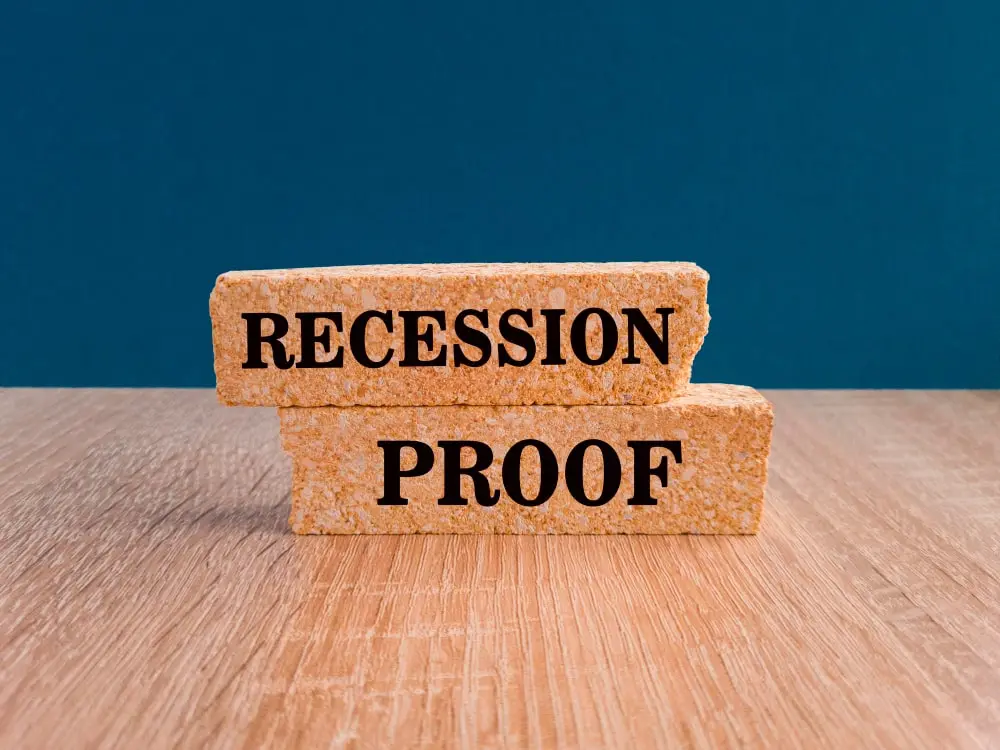Economic cycles encompass periods of significant decline and expansion. Although these downturns do not last long, they can cause significant losses or damage to investors. According to statistics, the S&P 500 has lost 32% on average during recessions since around 1937.
During recessions, investors must exercise greater caution and be diligent in monitoring market conditions to identify chances for high-quality assets at a reduced price. As can be observed, during a recession, the lowest-performing assets tend to be more leveraged.
A better recession scenario would entail investing in well-managed companies with low debt investments, high passive cash flow, and a balanced sheet. Some businesses, such as utilities, consumer staples, and discount merchants, are thought to be more recession-resistant than others. This is when having a clearer idea of recession becomes crucial.
What is a Recession?
A recession is defined as a widespread drop in market and economic activity. They often last a few months. It is defined in the media as two consecutive quarters of negative GDP. Recessions cause consumer and corporate confidence to deteriorate, resulting in reduced employment, lower income, reduced passive cashflow, and decreased sales. As a result, recessions enhance an investor’s aversion to risk. According to statistics, the US Gross Domestic Product fell significantly for two consecutive quarters in the first half of 2022.
In the third quarter, it climbed at an annual rate of 2.6%. Inflation remains high at 8.2%, prompting experts to forecast a recession. Focusing on the long-term view and managing your exposures while limiting risk and putting money aside to invest is critical. Interest rates typically fall during a recession, allowing investors to diversify their holdings.
For example, due to the assured return in real estate, a recession might be an excellent opportunity for investors to invest in real estate. Diversification like this would also aid you in recession-proof real estate investing. While it is important to recognize that the onset of a recession is unpredictable, diversification and certain strategies can assist in safeguarding capital.
Strategies for Stability to Apply while Investing during a Recession
Investing during a recession may seem illogical, but it has its perks and could provide a wonderful chance. When the economy is slow, some ways can help you invest to protect your money, locate hidden gems, and capitalize on profit chances. These are also strategies employed by investors to expand and diversify their portfolios. The following are a few strategies to implement and keep in mind when investing during a recession:
Cash Reserves: Cash on hand is a buffer during economic downturns. Cash reserves provide a safety net when companies cut back and job losses rise. It allows for flexibility in making investment decisions and taking advantage of opportunities that may arise amidst market volatility.
Defensive Stocks: Non-cyclical sectors, such as utilities, consumer staples, and healthcare, tend to remain relatively stable during recessions. Utility stocks provide essential services like electricity, which people require regardless of economic conditions. Consumer staples, including food and household products, exhibit consistent demand even during economic hardships. Healthcare, being a necessity, tends to remain stable across business cycles. Investing in these sectors can provide a defensive shield for your portfolio.
Dollar-Cost Averaging: Regardless of market conditions, this method entails regularly investing a set amount of money. During a recession, asset prices might fluctuate significantly. Utilizing dollar-cost averaging allows investors to buy more shares when prices are low and fewer when prices are high. This steady approach mitigates the risk of investing a large sum at an inopportune moment.
Quality Assets: Seeking out quality investments across various asset classes is crucial. Companies with low beta (less volatile than the overall market), high investment return, and low leverage tend to weather economic downturns better. Businesses with recurring revenue models or subscription-based services are often resilient during recessions as their revenue streams are more predictable and less impacted by economic fluctuations.
Dividend Stocks and Income-Producing Investments: Dividend-paying stocks offer a source of income, which can be particularly beneficial during turbulent market conditions. These stocks often pay dividends even if stock prices drop, providing stability and a regular income stream. Additionally, exploring other income-producing investments, such as real estate investment trusts (REITs) or high-yield bonds, can add stability to your portfolio.
Actively Managed Funds: During recessions, actively managed funds, led by experienced fund managers, can potentially outperform their counterparts. These managers may adjust the fund’s holdings to navigate market turbulence effectively, potentially yielding better returns than passively managed funds during downturns.
Bonds and Uncorrelated Assets: Since investment-grade bonds are typically less volatile than equities, they typically do well during recessions. Diversifying into uncorrelated assets like royalties, insurance-linked securities, or carbon credits can further enhance portfolio stability. These assets might behave differently from traditional stocks and bonds, potentially providing a hedge against market volatility.
Avoid making harsh decisions: Despite the challenges posed by a recession, it’s crucial not to make hasty decisions or drastic changes to your investing strategy in real estate notes. Attempting to time the market or react impulsively to short-term market movements can derail long-term financial plans. The secret to surviving economic downturns is to remain committed to your investing objectives and to keeping a diverse portfolio in line with your risk tolerance.
Conclusion
It may appear difficult to navigate a recession or economic slowdown. Strategic planning, a careful attitude, and the right approach will lead to profitable investments. It all comes down to thinking about the long term and making well-informed decisions. Diversification is the finest strategy to maintain a consistent financial record in investments and is fairly manageable.
Diversification allows one to locate the right assets with the right values while mitigating the impact of market swings. Investors must watch for excellent bargains, often appearing during recessions, which could be a ticket to future economic growth. Even if the economic landscape is a roller coaster and unpredictable, with adequate education, financial counsel, and adaptation, it is largely about riding the wave and being aware of the prize.
Work with Munshi Capital to help you navigate the challenges of investing during a recession. Learn how to protect and increase your wealth during difficult economic times. To customize your portfolio for stability and growth, and to learn about investments that are recession-proof, visit ReRx Funds.





